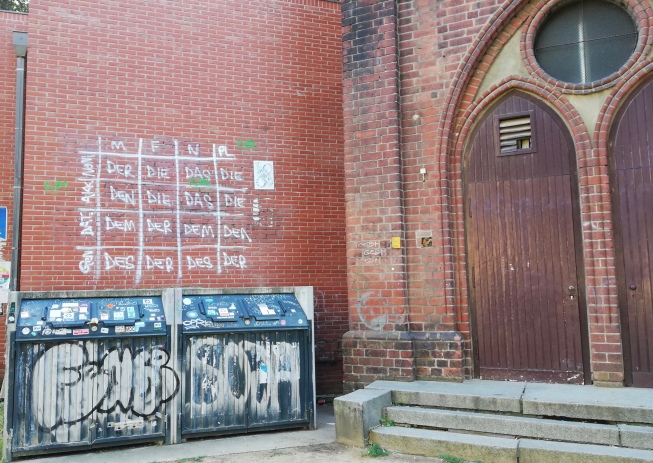These nine prepositions mess up what you’ve learned about the dative (III)

If a sentence were an opera, some nouns are the protagonists, the Heldentenöre, acting in unison with the verb while other nouns are receiving the action, playing the antagonists. They might be lovers or villains, but shine nevertheless. The dative case though has been assuming an unassuming role. It appears when the noun is merely a location of actions (Wir singen. Where? Auf der Bühne.) or when the noun is indirectly involved in the interaction of the others. (Wir schenken eine Blume. Whom? Dem Bariton.) However, what finally seems to us as something that makes sense, is messed up by a bunch of prepositions. They are the unruly extras on the stage, little words that disturb the logic of forming sentences we have aquired so diligently. Good news: Of the dozens of prepositions these are only nine.
aus.
It tells us about a movement (instead of a location), but insists that you have to use the dative: Wir gehen aus der U-Bahn-Station. (Die Station is feminine like all words ending with -ion by the way.)
zu, nach.
They describe a movement, too: Ich gehe zu dem Opernhaus (das Opernhaus, neuter), and Ich fliege nach Milano. We use zu for a specific destination like an opera house or a restaurant, and nach for an abstract location like a city or a country; nach also tells us about events following other events: Nach dem Sommer proben wir Don Giovanni. (Der Sommer is masculine like all months and seasons by the way.)
mit, bei.
Wir singen mit den Kindern. (plural die Kinder) Du wohnst mit Maria Callas. This means you share an apartment with her while Du wohnst bei Maria Callas means you moved into her house to live with her. Ich warte bei dem Würstchenstand. (I wait somehow near the sausage stand.)
von.
Ich habe die Blume von einem Verehrer (admirer).
seit.
This preposition marks the beginning of an activity that is still continuing. Seit dem Winter lebe ich in Berlin. Seit der Aufführung (performance) fühle ich mich glücklich.
ab.
This preposition marks a time in the future when an activity begins. Ab dem 9. November sind die Tickets für das Opernhaus billiger.
gegenüber.
Wir treffen uns gegenüber der Mozart-Statue.
Read next week: VIPs – very important verbs that need attention and the dative.



